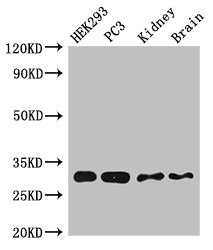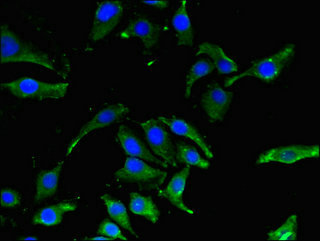Full Product Name
Rabbit anti-Homo sapiens (Human) CBR1 Polyclonal antibody
Alternative Names
15 hydroxyprostaglandin dehydrogenase [NADP+] antibody; 15-hydroxyprostaglandin dehydrogenase [NADP+] antibody; Carbonyl reductase [NADPH] 1 antibody; Carbonyl Reductase 1 antibody; CBR 1 antibody; CBR1 antibody; CBR1_HUMAN antibody; CRN antibody; NADPH dependent carbonyl reductase 1 antibody; NADPH-dependent carbonyl reductase 1 antibody; Prostaglandin 9 ketoreductase antibody; Prostaglandin 9-ketoreductase antibody; Prostaglandin E(2) 9 reductase antibody; Prostaglandin-E(2) 9-reductase antibody; SDR21C1 antibody
Species Reactivity
Human, Mouse
Immunogen
Recombinant Human Carbonyl reductase [NADPH] 1 protein (176-268AA)
Immunogen Species
Homo sapiens (Human)
Conjugate
Non-conjugated
The CBR1 Antibody (Product code: CSB-PA004586LA01HU) is Non-conjugated. For CBR1 Antibody with conjugates, please check the following table.
Available Conjugates
| Conjugate |
Product Code |
Product Name |
Application |
| HRP |
CSB-PA004586LB01HU |
CBR1 Antibody, HRP conjugated |
ELISA |
| FITC |
CSB-PA004586LC01HU |
CBR1 Antibody, FITC conjugated |
|
| Biotin |
CSB-PA004586LD01HU |
CBR1 Antibody, Biotin conjugated |
ELISA |
Purification Method
>95%, Protein G purified
Concentration
It differs from different batches. Please contact us to confirm it.
Buffer
Preservative: 0.03% Proclin 300
Constituents: 50% Glycerol, 0.01M PBS, PH 7.4
Tested Applications
ELISA, WB, IF
Recommended Dilution
| Application |
Recommended Dilution |
| WB |
1:500-1:5000 |
| IF |
1:50-1:200 |
Storage
Upon receipt, store at -20°C or -80°C. Avoid repeated freeze.
Lead Time
Basically, we can dispatch the products out in 1-3 working days after receiving your orders. Delivery time maybe differs from different purchasing way or location, please kindly consult your local distributors for specific delivery time.
Usage
For Research Use Only. Not for use in diagnostic or therapeutic procedures.








